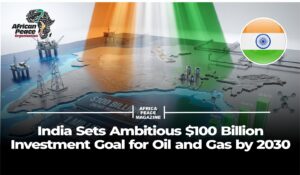Pioneering New Finance Models in Africa Towards ‘Greener’ Future
Promoting sustainable development is key to securing Africa’s future, and “green financing” plays a vital role in driving this transition. This includes loans, bonds, and other funding mechanisms specifically designed to promote positive environmental impact such as initiatives that reduce carbon emissions or water use, improve energy efficiency, protect or restore biodiversity.
Standard Bank Corporate and Investment Banking (CIB), has a footprint across 20 African countries and has been operating for 162 years. It recently hosted its inaugural Africa Markets Conference from 23 to 25 March 2025 in Cape Town. Bringing together global and African investors, risk leaders, policymakers, and regulators, attendees explored how to mobilise capital flows to meet Africa’s structural needs and drive sustainable growth. Mobilising green finance was one of the central themes of focus at the event.
“This was an opportunity to forge meaningful partnerships, foster innovation, and build a shared investment vision for the decade ahead,” explains Sasha Cook, head of sustainable finance at Standard Bank Corporate and Investment Banking (CIB).
Powering green loans and energy security
While in 2024, the bank’s energy portfolio consisted of 71.9% non-renewable energy and 28.1% renewables*, Standard Bank recently published sustainable finance targets to mobilise >R450bn ($24.31bn) of sustainable finance between 2022 and 2028, and has also set a sub-target of mobilising R100bn in green finance between 2025 and 2028. Cook explains that the group defines sustainable finance as mobilising capital for positive impact, and green finance is a subset of this. “Green finance is essentially finance mobilisation to support key green activities such as renewable energy, ‘green’ buildings, sustainable water, biodiversity conservation and sustainable agriculture,” she says.
The group also recently announced successful closing of a $250m seven-year unsecured loan from the International Finance Corporation (IFC), which will significantly bolster its efforts in promoting sustainable development through green financing in the South African market. In the case of the IFC loan, funds will be allocated towards two green portfolios: the greenfield development of “green” buildings (across the industrial, retail and residential sectors, including an additional focus on affordable housing within the residential sector) and the financing of loans for consumers acquiring green certified homes.
Rewarding ‘green’ property performance
According to UNEPFI, almost 40% of global emissions comes from the real estate sector, it is therefore essential to ensure that the sector continues to focus on improving its environmental impact. “When we talk about development of ‘green’ buildings, we are referring to constructing or retrofitting real estate in a way that ensures energy efficiency, water efficiency and the use of environmentally-conscious construction materials,” says Cook. “There are costs associated with obtaining credible green building certifications, which can be a potential hurdle for developers. They often require these certifications to be able to access green financing.”
The IFC loan comes with a performance-based incentive, funded by the UK’s Department for Energy Security & Net Zero. Cook says that Standard Bank South Africa (SBSA) plans to use this incentive to help eligible developers and homeowners cover the costs of obtaining green building certification which may include building consultants’ costs and registration with relevant building accreditation bodies. “The incentive is allocated to eligible developers or eligible home loans customers, and it essentially rebates some of the cost of obtaining the green certification or acquiring the ‘green’ home,” Cook says.
Green city accomodation
“By leveraging blended finance solutions like this, we’re able to encourage more real estate clients and homeowners to adopt ‘green’ building standards. Accelerating the construction of ‘green’ buildings will contribute towards reducing the positive environmental impact through reduced fewer emissions in construction as well as the operation of the building, but for the users of these buildings (whether it’s a homeowner or a corporate tenant), having a more efficient building also facilitates lower operational costs – it reduces expenses like utility costs, and can have a positive impact on property valuations.”
Developing new funding models
Blended finance is an important tool beyond enabling more environmentally-conscious construction and is increasing in relevance across all areas of infrastructure and energy development, explains Cook. “My view is that blended finance is a key tool required to mobilise finance at scale to drive positive social and environmental impact across the continent,” she says. “What is critical is finding scalable solutions – instruments like guarantees can be powerful in scaling blended finance.”
Transactions like the IFC loan help us to drive and accelerate our own sustainability strategy. While this specific loan was focused on ‘green’ buildings, there are other successful case studies. For example, in December 2024, we raised funding in the form of a social bond where the African Development Bank was the investor to support financing for Small, Medium and Micro Enterprises (SMMEs) in South Africa.”
Cook goes on to explain that Standard Bank wants to play a leading role in developing scalable sustainable finance models. The bank recently partnered with South Africa’s Industrial Development Corporation (IDC), a state-owned development finance institution, to develop IDC’s inaugural sustainable bond framework and acted as arranger and sustainability coordinator on IDC’s first R2bn sustainable bond issuance, where the IFC was an anchor investor. “This was an important partnership because it will facilitate the IDC being able to raise funding in sustainable finance format to help drive their own sustainability strategy, which is linked to key development areas for the country,” says Cook. “There is also increasing focus on transition finance – defining what it is, how it fits into sustainable finance more broadly, what it means in terms of supporting our clients on their own decarbonisation journeys.” *While Standard Bank continues to finance new oil and gas projects, it has set a target to limit its upstream oil and gas exposure to less than 30% of its energy portfolio, and less than 3% of its total loans and advances by 2030.





